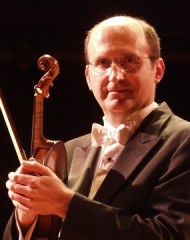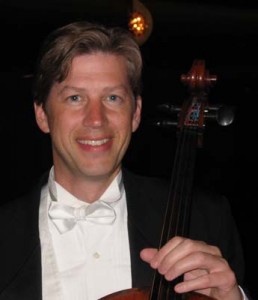The musicians of the Salt Lake Symphony like to challenge themselves and do things in a big way.
They get to do just that when the symphony kicks off its new season Saturday with an ambitious program that features two major works: Johannes Brahms’ Double Concerto, for violin and cello, and Jean Sibelius’ Symphony No. 1.
As far as anyone knows this will be the first time the Salt Lake Symphony will be playing the Brahms, said music director Robert Baldwin. “We have a couple of players who’ve been with the orchestra since its start in 1976, and none can remember ever playing the Double Concerto.”
Soloing will be two Utah Symphony members: concertmaster Ralph Matson and cellist John Eckstein. “Because of their schedules they were free this week,” Baldwin said. The timing worked out for everyone, but it doesn’t give the two musicians much of a break. This concert comes between last week’s Utah Symphony performances of Hector Berlioz’s La damnation de Faust and Richard Strauss’ Salome on Oct. 18 and 20.
It was Eckstein who brought up a collaboration with Baldwin. “John played Elgar’s Cello Concerto with us four years ago and he wanted to work with us again,” Baldwin said. He was thrilled with the chance to team up with Matson and Eckstein.
The Double Concerto is an interesting work, Baldwin said. “It has the depth of his Violin Concerto or Dvořák’s Cello Concerto, but there is also a chamber music feel to it.” And from the conductor’s perspective it’s a great work all around. “The two soloists are on an equal footing, almost in the same way as in Mozart’s Sinfonia Concertante or one of Bach’s double concertos. And the orchestra is a partner, and even takes over in certain sections. It’s really a gratifying work for an orchestra.”
That’s also true for Sibelius’ First Symphony. “There are some wonderful solo moments in the work, but it’s really a tutti symphony,” meaning it’s scored mainly for the entire orchestra.
As a young composer, Sibelius fell under the spell of Tchaikovsky. “You can hear that influence, but it’s actually a much more mature work than early Tchaikovsky, and you can hear Sibelius’ distinctive language coming out in places.”
Baldwin added that the work is “landscape driven.” In 2008 Baldwin visited Finland, and wherever he went he was reminded of Sibelius’ music. “I would stand on a bluff overlooking the sea or a harbor and that brought Sibelius’ music to mind. He captured that imagery perfectly. It’s no surprise that there are statues of him everywhere in the country.”
Rounding out the program is local composer Henry Wolking’s Salt Lake Overture. “Henry wrote this piece for us in 2002, when James Caswell was music director,” Baldwin said. “It’s made up of a lot of the music he wrote for the [2002 Winter] Olympics that wasn’t used.” But the work isn’t Olympic themed, though. “It’s an optimistic piece. It has a heroic sound, and there are lots of fanfares and contrasting sections.”
The overture hasn’t been played on a concert since its premiere, and Baldwin is happy to program it. “It happens all too often that a new piece disappears into the library after it’s been played. A lot of good works end up being forgotten that way. It’s our responsibility to make room for new works while keeping the standard repertoire going.”
- CONCERT DETAILS
- What: Ralph Matson, violin, John Eckstein, cello, Salt Lake Symphony, Robert Baldwin, conductor
- Venue: Libby Gardner Concert Hall, University of Utah
- Time and Date: 7:30 p.m. Oct. 5
- Tickets: $10 general, $5 seniors and students
- Phone: 801-531-7501
- Web: www.saltlakesymphony.org
- ALSO: Pre-concert discussion with Henry Wolking and Robert Baldwin, Room 270 (Choral Room), Libby Gardner Concert Hall, 6:15 p.m., free.


